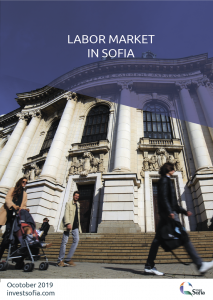BULGARIAN ECONOMY
New Report – Labor Market in Sofia 2019
Some of the key points from the report:
- In 2018, the employment rate exceeded 75% for the population aged 15-64, close to the figure in the EU’s most economically advanced regions.
- The number of employees has increased over the last five years in all educational groups.
- More than half of the employees in Sofia in 2018 are 30-49 years old, but in recent years there has been a significant increase in employment in the 55+ group.
- During the period under review (2013-2018), between 50 000 and 70 000 new jobs were created in Sofia. Employment is growing in all economic activities except trade and healthcare with the most significant growth being observed in the ICT, outsourcing and real estate sectors.
- The structure of employees by economic activities in Sofia differs significantly from that in Bulgaria as a whole. This is most evident in the role of the manufacturing industry – while at national level it is the leading industry with 600 000 employees in 2018, in Sofia it is smaller than both the trade and, more recently, the ICT sector.
- The educational structure of the employed also distinguishes Sofia from the rest of the country. While the overall labour market is clearly dominated by those with secondary education – a total of 1 802 000 in 2018, compared to 997 000 with university degrees – the balance in Sofia is in favour of those with higher education.
- Higher education in Sofia it still dominated by the economics and social sciences majors, but in recent years there has been an increasing interest in mathematical and technical specialties. The distribution of graduates by field of education in Sofia demonstrates that there is a discrepancy between the profile of graduates and the structure of the city economy, especially in terms of the fastest growing industries.
- Following the current dynamics, in the next five years the city economy will add new employment predominantly in ICT and outsourcing but will lose employment in health and trade.
- The last five years have been a period of high wage growth. The ICT sector is leading that trend offering a gross monthly salary of over BGN 3 000 as of end of 2018.
- The salary estimate indicates that all sectors without the hotel and restaurant industry will offer a gross monthly salary of BGN 1 000 and the average salary for Sofia will reach BGN 2 000 by 2023, with almost BGN 2 200 on average for men and BGN 1 800 on average for women. Salaries in most industries will rise by 20-30%, with the exception of culture and sports, where the projected growth is 15%.
More detailed data, charts, analyzes and trends can be found in the full version of the report HERE.
Source: Sofia Investment Agency
NEWS FROM BCCI
Meeting with the newly appointed Ambassador Extraordinary and Plenipotentiary of Israel
The currents state of the commercial and economic relations between Bulgaria and Israel was discussed More
BCCI issues Excellent SME certificate
To promote successful SMEs, secure and safe business, good business practices and to increase market transparency More
The Honorary Consul of the Republic of Mauritius visited BCCI
A business delegation from the African country is preparing to visit Bulgaria More
INVESTMENT NEWS
Germans to open IT Hub in Sofia
400 jobs will be initially created for highly qualified IT professionals, with the tendency to increase to 600 More
Financial Times: Bulgaria attracts record tech investment
The ICT sector had sales of USD 3.2bn in 2018 More
BULGARIAN ECONOMY
Bulgarian Trade with EU and with third countries
In the period January - October 2019 the exports of goods from Bulgaria to third countries increased by 5.8% More
New Report – Labor Market in Sofia 2019
In 2018, the employment rate exceeded 75% for the population aged 15-64 More
ENERGY AND ENERGY EFFICIENCY
The Greece-Bulgaria intersystem gas connection was ratified
The project is included in the seven most important priorities of the European Union More





